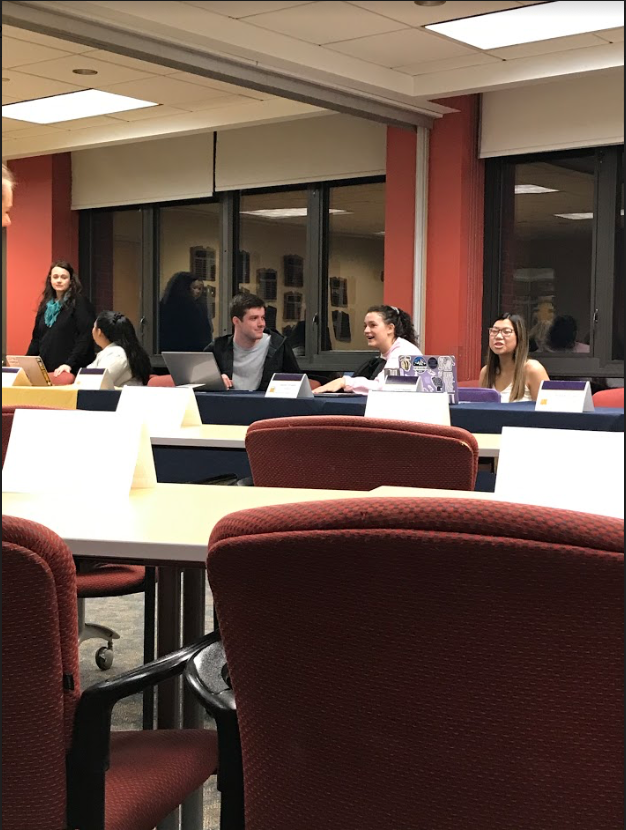ASG welcomes Binnington as guest speaker at general assembly, discusses decisions being made regarding affiliation with Methodist Church
Allegheny Student Government prepares for its weekly general assembly meeting at 7 p.m. on Tuesday, Nov. 19, 2019 in the Henderson Campus Center room 301/302.
The packed 301/302 room went in tandem with the packed budget at Allegheny Student Government’s latest general assembly meeting.
ASG welcomed Dean of Curriculum and Registrar Ian Binnington to discuss the plan to move away from using WebAdvisor, along with an update on student retention rates, at its general assembly at 7 p.m. Tuesday, Nov. 19, in the Henderson Campus Center.
Binnington began with the College’s plan to move away and replace WebAdvisor with a new, modern website that students would be able to use.
“I got here in 2006,” Binnington said. “WebAdvisor was here in 2006. It was old technology at that point. … It predates most of your births, and we are going to replace it.”
Binnington described the successful beta testing of a new system that occurred the week before senior registration for the upcoming semester opened. The new program is called “Self Service.”
“It’s not a sexy name, I know, I didn’t pick it,” Binnington said. “That’s the name that came out of the box.”
Additionally, Binnington said there are more tests to be run and technological kinks to be worked out, but another full scale test will be conducted in April 2020 to prepare to have the system to be put in place for the Fall 2020 semester.
The differences between the systems include all classes available in the upcoming semesters will be able to be seen at one time, along with a more efficient way to plan out schedules, and a plan for faculty advisers to have a better idea of what their students are interested in registering for, according to Binnington.
“The search functions in this are amazing,” Binnington said. “You know WebAdvisor, it works, every student gets registered. But it’s not pretty, and it’s not super functional. This is going to allow for dynamic searching. It will allow you to filter by major and key word, faculty, time and by a whole bunch of things that WebAdvisor sort of does but kind of doesn’t.”
Binnington added that another goal of the new site is to reduce the amount of classes being added by paper add cards.
“I looked, for last year, ’18 Fall (Semester), and ’19 Spring (Semester), the 1,700 of you added 14,000 classes,” Binnington said. “There were 14,000 add operations. We did over 5,000 of them on paper.”
Binnington said that although it will not be possible to move away from paper entirely, the goal is to reduce that 5,000 paper adds dramatically. Also, more of the advising process will be done online too, if everything works according to plan.
“It’s going to be a little chaotic,” Binnington said. “There’s no way to implement a major new piece of software without testing it. We have tested it and we will test it (more), but one person testing it and 1,500 people using it is not the same.”
Binnington then moved into the ways that the College is looking to increase retention rates for first- and second-year students. The current retention rate is up 4% from last year.
Binnington emphasized that Allegheny is not unique in regards to retention rate, saying that Allegheny suffers from the same concerns as most colleges across the United States. He then listed groups of demographics that were more likely to graduate at higher rates. The list included women, students who were not first generation, more academically prepared students and students who live closer to the college they are attending.
“That is the national reality,” Binnington said. “That is the reality across most colleges and universities (in the United States). Allegheny beats the national averages in just about every category. … But populations don’t retain — people do.”
Binnington discussed some current and future plans the College is working on to improve first-year experience, which is being done under the direction of Associate Professor of English and Director of Writing Alexis Hart. New initiatives include better advising for first years in their First-Year/Sophomore Program classes and housing first-years in four specific residence halls.
Binnington also described steps being taken in specific departments to “revamp” curriculum and better help students pass those classes, specifically the Chemistry and Math Departments.
“This is not to inflate grades,” Binnington said. “It’s to think about how we can help students to be successful.”
Binnington ended his presentation by discussing ways to help and be more inclusive for non-traditional students who come to Allegheny.
“What this basically comes down to at the end of the day is the implicit promise that we make to students when we admit them to Allegheny,” Binnington said. “It’s not a legal promise, we’re not promising you that you’re going to graduate. But what we should be promising you is that if you put the effort in, then you have the opportunity to graduate and be successful.”
After Binnington’s presentation, ASG moved into constituent comments, where two main concerns were brought up. One concern was about a recent poster that was hung up around campus that made the use of a racial slur look like a joke. Another concern was the College’s decision to continue to be affiliated with the United Methodist Church after the passing of the Traditional Plan last year that excluded those in the LGBTQ community from being a part of the church. Constituents felt that remaining affiliated went against Allegheny’s statement of community, and that the financial implications of not being affiliated would be less than it would if LGBTQ students left the college. Some also did not feel comfortable telling members of that community that they should come to Allegheny.
Both issues were brought up multiple times during ASG’s cabinet reports.
Director of Diversity and Inclusion Taylor Marzouca, ’20, told the room about her recent meeting with President Hilary Link, where they discussed a possible placeholder to fix the affiliation problem for the time being.
“So there are some options that we are exploring,” Marzouca said. “The main one that we are looking to have meetings with students on is the possibility of in the interim, not as a long-term solution, but while we’re waiting to see if the church will split or stick with the decision, but we’re looking at affiliating with this other group that will branch off of the Methodist Church that is a group that is allied with the LGBTQ community. So we’re looking at that as a possible placeholder, but we’re very aware that that’s not a long term solution. We’re looking to see how students feel about doing that.”
Marzouca also said that she has spoken with the Inclusion, Diversity, Equity, Access and Social Justice Center about the poster involving the racial slur, to see what they know about it and to see if she can find out more about the situation.
“This past week, there was an incident, kind of in reaction to another incident where there was a poster that was distributed but kind of not supposed to be distributed in some ways, describing who and in what ways the (racial slur) can be used,” Marzouca said. “We talked to the IDEAS center, and we will talk to them again to find out what exactly is going on. It’s not a great situation, we are trying to figure out how best to carry on considering this situation.”
One constitution and one resolution were brought to ASG in Attorney General Brandon Zabo’s, ’22, report. The Birding Club’s constitution was approved for the second week, and the Worker’s Resolution was also approved.
In the next report, Chief of Staff Jared McHale, ’20, discussed the possibility of moving Gator Day to Election Day.
“(The College Committees Council) still has to vote and discuss this, but it’s only a week difference so there’s not a huge concern,” McHale said. “Though it does throw off their schedule a little bit.”
Following McHale’s report, Co-Director of Student Affairs Genesis Pena, ’22, said that the plan to have feminine dispensers in the women’s bathrooms in the campus center has been backed up because of Physical Plant having to deal with the recent vandalism.
“Basically they are on backorder in Physical Plant because they have to deal with all of the recent vandalism on campus, so Physical Plant is super swamped,” Pena said. “So until that starts to die down and Physical Plant has more availability, (the feminine-hygiene-product dispensers are) not going to go up.”
Following cabinet reports, each class reported on upcoming events and plans, including getting printers in Ravine-Narvik Hall and partnering with the Wellness Committee.
In her Vice President’s report, Elyse Cinquino, ’20, gave an update on the printer points system, saying that each student got an additional 2,000 points because of the system not officially being implemented where points do not roll over until this semester.
Following Cinquino, President Jason Ferrante, ’20, gave an update on the upcoming major concert, and announced the cabinet and senate members of the month. The cabinet member of the month for November was Marzouca, and the senate member was Ashley Leonard, ’20.
In unfinished business, the resolution on Indigineous People’s Day was passed. ASG senate members who helped earlier in the day with Talk About It Tuesday discussed situations that their constituents had brought to them, including undercooked food at Brooks Dining Hall. Senators were advised by cabinet to tell constituents to respectfully talk to Parkhurst employees about this, and added that a lot of other problems needed to be told to individual resident assistants.
In new business, the United Methodist Church was brought up once more.
“One of the biggest questions is what is the College’s financial obligation to the United Methodist Church,” Ferrante said. “College Chaplain Jane Ellen Nickell is working to put together these exact numbers, but one number that I do have that specifically UMC gives to us is … a 1.1 million dollar endowment, which generates $50,000 anually. That fund is not the entirety of a professor’s salary, but that’s part of that professor’s salary. So that’s one of the concrete things I wanted to talk to you about today.”
Ferrante reiterated the earlier point of looking for interim measures while policies are still being decided by the United Methodist Church, which will be meeting again in May 2020. During that May 2020 meeting, the United Methodist Church could split, resulting in an inclusive group with which Allegheny could affiliate.
A question was posed as to why the Board of Trustees is still waiting for action from students regarding the United Methodist Church decision after last year.
“I can’t speak for the Board of Trustees,” Ferrante said. “I can answer for what we can do in our student body senate. … Whenever they are, please go to the community discussions (about the United Methodist Church affiliation), they will be really important in informing us and the Trustees about about what the College administration (is planning).”
Another question was posed about what would happen to the scholarship students receive from the United Methodist Church.
“These are all things that are being considered,” Marzouca said.
After a few more opinions were raised by constituents about the United Methodist Church and the flyer discussing the racial slur, the general assembly meeting closed at 8:23 p.m.

Sara Holthouse is a senior from Panama, NY. This is her third year/final semester on staff, where she has previously served as news editor for the past...










Jared McHale • Dec 10, 2019 at 5:23 pm
look at gabby miller in this pic hahaha